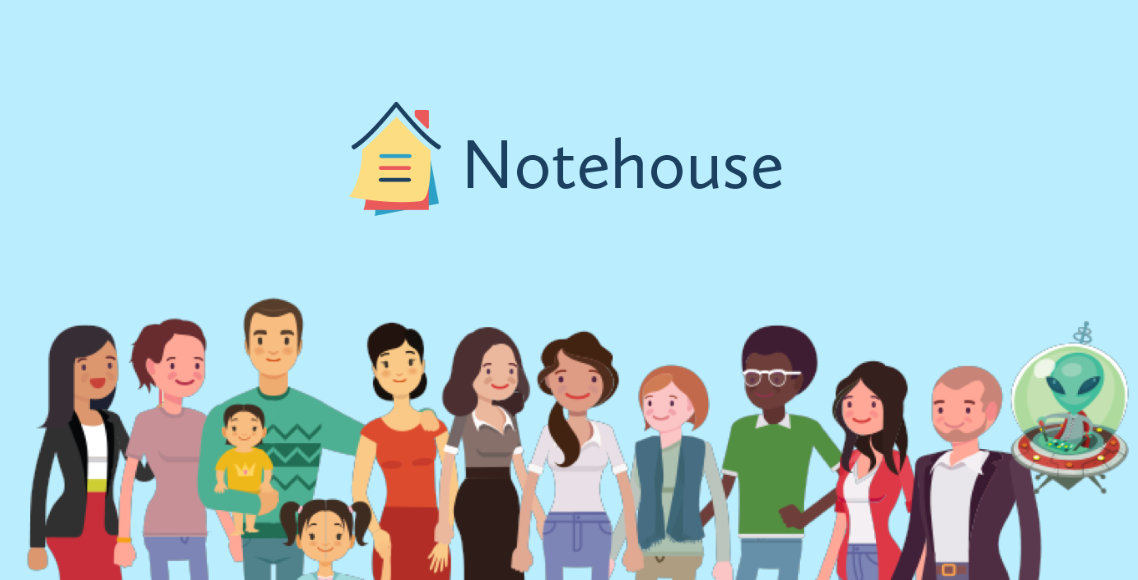What the Heck is HIPAA? A Comprehensive Guide
_L.png.png)
You’ve probably heard the term "HIPAA" everywhere—at doctors' offices, in discussions about healthcare, or while signing paperwork. But despite its frequent mention, most people don’t fully understand what HIPAA really is.
When we started Notehouse, we knew that becoming HIPAA compliant was essential for creating the most user-friendly case management system in the universe. After all, we know you care about your clients and want to protect their sensitive data!
However, embarking on this journey to understand HIPAA was no small feat. We encountered a maze of unclear answers about what HIPAA really means and how to ensure compliance. After countless Google searches and misleading guidance from consultants, we decided to put on our "big programmer pants," brush off our law degrees, and conduct our own research.
Disclaimer: The information provided here is not intended as legal advice. Always consult with a legal professional to ensure HIPAA compliance.
So, What is HIPAA?
HIPAA stands for the Health Insurance Portability and Accountability Act, a federal law signed by President Clinton in 1996. Contrary to popular belief, the "P" in HIPAA stands for "Portability," not "Privacy." The legislation was designed to protect and manage health insurance coverage for individuals while promoting data privacy and security.
Clinton emphasized the importance of this law by stating, “With this bill, we take a long step toward the kind of health care reform our nation needs. It seals the cracks that swallow as many as 25 million Americans who can’t get insurance or fear they’ll lose it.”
Key Goals of HIPAA:
Ease of Access: Making it easier for the self-employed to purchase insurance.
Fraud Prevention: Preventing fraud and abuse by healthcare providers.
Administrative Simplification: Reducing administrative burdens within the healthcare system.
Medical Savings: Allowing for new medical savings.
Improved Long-Term Care Access: Enhancing access to long-term care.
Interestingly, the focus on privacy was initially secondary, with the primary aim of administrative simplification. It wasn’t until three years later that the U.S. Department of Health and Human Services proposed the HIPAA Privacy Rule (read below!) to establish national standards for protecting health information.
You can access the full text of HIPAA, including the Privacy Rule, through the Department of Health and Human Services.
The HIPAA Privacy Rule
Finalized in 2000, the HIPAA Privacy Rule “establishes national standards to protect individuals' medical records and other individually identifiable health information.” The Rule mandates that anything considered "Protected Health Information" (PHI) has specific safeguards to ensure its protection.
PHI Definition: According to Section 160.103 of the act, PHI is defined as any information related to:
An individual’s past, present, or future physical or mental health condition
The past, present, or future healthcare provided to an individual
The past, present, or future payment for the provision of healthcare to an individual
Additionally, Section 164.514(b)(2) outlines 18 identifiers that must be removed to de-identify information, ensuring it is not considered PHI under HIPAA. These identifiers include, but are not limited to, the individual's location, date, account number, and contact information.
For a more accessible version of the rule, without legal jargon, refer to the Department of Health and Human Services' resources, found here.
Who Needs to Comply with HIPAA? Understanding Covered Entities and Business Associates
HIPAA primarily applies to "covered entities," defined in Section 160.102 as health plans, health care clearinghouses, or "a health care provider who transmits any health information in electronic form in connection with a transaction covered by this section of HIPAA."
HIPAA also applies to "business associates," as defined in Section 160.103. Business associates are individuals or companies that perform services or functions on behalf of covered entities involving PHI access. This includes consultants, accountants, billing companies, and software services like Notehouse.
What Does Being HIPAA-Compliant Mean?
Under Section 164.306(a), covered entities and business associates must do the following to ensure HIPAA compliance:
"Ensure the confidentiality, integrity, and availability of all electronic protected health information the covered entity or business associate creates, receives, maintains, or transmits."
"Protect against any reasonably anticipated threats or hazards to the security or integrity of such information."
"Protect against any reasonably anticipated uses or disclosures of such information that are not permitted or required under the law."
But what do these provisions mean? And how can someone "prove" HIPAA compliance?
Contrary to popular belief, HIPAA is not a one-size-fits-all approach; instead, it allows for flexibility in achieving compliance based on an entity's size, capabilities, and the nature of its operations.
Section 164.306(b) of HIPAA specifically codifies a "flexibility of approach," allowing covered entities and business associates to use any security measures, often referred to as safeguards, that reasonably and appropriately implement the specified standards. Factors such as the entity's size, complexity, technical infrastructure, and the cost of security measures play a critical role in determining which exact safeguards are necessary for compliance (45 CFR § 164.306(b)(2)).
Additionally, covered entities and business associates often establish Business Associate Agreements (BAAs) to define their roles in ensuring HIPAA compliance and outline each party’s responsibilities for protecting PHI.
Wait, does that mean I need a BAA in place?
Yes and no. HIPAA allows for a “flexibility of approach,” so let’s break down what that actually means.
Section 164.502(e)(1) states that a covered entity may disclose PHI to a business associate or allow the business associate to handle PHI on its behalf if the covered entity obtains satisfactory assurances that the business associate will appropriately safeguard the information. (Emphasis added.)
In plain language, this means that if a covered entity involves a business associate in handling PHI, then the covered entity must obtain “satisfactory assurances” of PHI protection.
So what does 'satisfactory assurances' mean?
Here’s where BAAs come in. Section 164.502(e)(2) clarifies that these “satisfactory assurances” must be documented “through a written contract or other written agreement or arrangement with the business associate that meets the applicable requirements of § 164.504(e).”
This requirement has led to the formal concept of a Business Associate Agreement. However, the law technically allows for a written contract, another written agreement, or any “arrangement…that meets the applicable requirements” as outlined."
HIPAA Safeguards at Notehouse
We’re committed to transparency and security, and we figured it might be useful for you to see what we’ve implemented to ensure HIPAA compliance at Notehouse. Here’s a summary of some of the safeguards we’ve established:
Data Inventory: Maintain an accurate inventory of all enterprise assets that may store or process data. [45 CFR 164.310(d)(2)(iii)]
Data Encryption: Encrypt sensitive data in transit and at rest. [45 CFR 164.312(a)(2)(iv)]
Data Management Process: Establish a data management process addressing data sensitivity and ownership. [45 CFR 164.316(b)(2)(i)]
Access Controls: Implement data access control lists based on user roles. [45 CFR 164.308(a)(3)(ii)(A)]
Automatic Lockout: Enforce automatic device lockout after a predetermined number of failed authentication attempts. [45 CFR 164.310(d)(2)(iii)]
Incident Response Training: Train workforce members on identifying and reporting potential security incidents. [45 CFR 164.308(a)(6)(ii)]
Service Provider Management: Assess and ensure service providers meet security requirements. [45 CFR 164.308(b)(8)]
For a complete list of HIPAA safeguards and their implementation at Notehouse, visit our website! And yes, we’ll even sign a BAA ;)
Simplifying Your HIPAA Compliance with Notehouse
If you're navigating the complexities of HIPAA compliance, we understand how overwhelming it can be. But it doesn't have to be. At Notehouse, we are not just committed to providing a HIPAA-compliant platform; we are dedicated to creating a user-friendly experience that empowers organizations to focus on what truly matters—supporting their clients and managing their cases effectively.
While many other platforms in the market are often overly complicated and clunky, Notehouse stands out with its intuitive design and seamless functionality. We believe that managing sensitive health information shouldn't be a cumbersome task. Our platform is engineered to streamline your workflow while ensuring the highest standards of data security and compliance.
With Notehouse, you gain access to:
User-Friendly Interface: Our platform is designed to be intuitive and easy to navigate, allowing you to spend less time on training and more time on serving your clients.
Robust Security Features:We take data protection seriously. Notehouse incorporates advanced security measures, including end-to-encryption and multi-factor authentication, to safeguard your sensitive information.
Dedicated Support: Our team is here to support you every step of the way. Whether you have questions about HIPAA compliance or need assistance with our software, we are just a message away.
Flexible Solutions: Notehouse is adaptable to various organizational needs, making it a perfect fit for healthcare providers, consultants, and organizations of all sizes.
If you’re searching for the best HIPAA-compliant software that combines security with ease of use, consider giving Notehouse a try! Even if you're currently exploring your options or learning about HIPAA, we hope this article serves as a valuable resource for your compliance needs..
Choose Notehouse for a platform that prioritizes your mission, simplifies your processes, and keeps your clients’ data safe. In fact, we think you’ll love Notehouse so much that we’ll give you a month free with discount code HIPAABLOG at checkout. Experience the difference today!
_L.png)

.png.png)
.png.png)
.png.png)